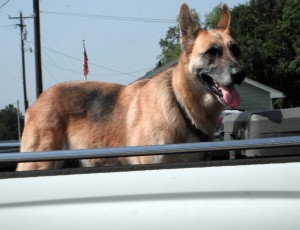For some reason I feel as if I should explain why I missed writing a few days during the latter part of last week although I cannot think of too many rational reasons for or against. I suppose someone might wonder if I am sick or whether my arthritic and diabetic infirmities have taken tight hold against me. Then again, most people who know me can find out that is probably not the case by looking at my Facebook page. Pardon me, I’m just thinking out loud. I was busy last week with work. Every now and then I have to work evenings and it so happened I had to work two evenings in a row, which pretty much bites.
To round out my personal life, this weekend I attended the 50th wedding anniversary celebration for my oldest brother and his wife. I find that a remarkable achievement this day and age, thus I likewise declare myself very proud of the couple for their accomplishment. I also spent the night at the next brother in age — I have four brothers, all older — who is the only to live in my hometown. I even slept in what was my room during my high school years, a wonderful room it is though a bit different than during my tenure there.
I am very fond of my hometown, a small East Texas former sawmill town, with a population of near 2,500. The number of folks living there has not changed too terribly much since I grew up and left for the Navy — and more or less for good — in the mid-1970s. It’s, as some folks like to say, a great place to be from. That means it is nice. It is full of fond memories and good people. I am not very big on everyone knowing my business though and that is something you get everywhere but most especially in a small town. Nonetheless, I suppose if a place popped up for next-to-nothing in the country near there it might be a place where I could retire. I mean retire retire and not play-like retired as I sometimes find myself doing.

One thing for certain, when I do move again it will be to a place where I can have an animal or two. That would be a dog for certain and maybe a cat as well as a pet aardvark or llama. That is jest on the latter two, as in jest fooling. I certainly wouldn’t want to keep a llama. They can be amiable but I have just had one too many llama spit at, though luckily not on, me. Just as I would not want a dog to bite a visitor — an intruder is a different story — I would not want me llama es Llama to spit on someone who came calling.
I really would like a dog. It’s been about 25 years since one lived with me, the last being the remarkable Cochise. I say remarkable in that it was remarkable he, it, didn’t injure someone. Cochise, as I have spoke of this wonderful dog in the past, was a half-Doberman and half-great Dane. He was a beautiful animal with the Dane size and mostly Dobie features. He didn’t have a docked tail nor did he have cropped ears. A college friend gave him to me since I lived on a cow pasture. I sometimes call it a farm but nothing was raised except cattle. The place was a couple hundred acres in size but certainly it wouldn’t pass in Texas for a ranch.
Cochise liked running the fields and chasing a tennis ball or retrieving a tree limb bigger than the both of us. He was well-trained for a number of feats such as jumping up in my pickup bed on the command of “mount” and the opposite “dismount” to get the dog out of the truck. Once, I drove up to the little convenience/liquor store about a mile from the house. I didn’t take Cochise and he followed me all the way to the store.
I was horrified to see Cochise had “mounted” but in the bed of a pickup belonging to my grumpy neighbor. I got him out of the neighbor’s bed just as the man was coming out of the store. I couldn’t do much more than apologize. This was the neighbor who didn’t like me too much because we would do some shooting up where I lived. You know the usual, shooting cans, targets, beer bottles, watermelons, couches … This fellow was uptight about that sort of thing, concerned his cows might get shot. He also had a general worry about firearms due — according to the man’s account — to his getting shot in the ass by a chicken in a German farm yard on the last day of World War II. The soldier had laid his sub-machine gun on top of a chicken coop and the chicken jumped up and triggered the gun, giving this fellow the distinction of earning a Purple Heart earned in combat with a fowl German. Or maybe that was a German fowl. Oh hell’s bells.
If there is a point to be made here — maybe there is and maybe not — it is that it is nice to have a dog around the house, or a cat, even a llama if you can keep it from spitting. Chickens have their place as well, but it certainly isn’t around a firearm.

